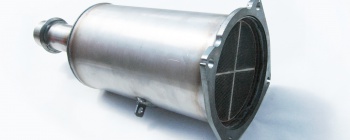
The importance for Trucks
Euro-6 emissions regulations have meant a rapid increase in the number of trucks on the road fitted with diesel particulate filters (DPFs) – an essential part of Euro-6, which prevent particulate matter and other emissions from being released into the atmosphere.
DPFs are an essential maintenance item for operators to factor into their vehicle schedules, which must be cleaned or replaced at regular intervals. With filters for commercial vehicles costing between £1,200-£4,000, replacing items damaged through clogging or mishandling is an expensive business.
Slough-based emissions specialist Ceramex has developed new processes for cleaning and inspecting DPFs, as well as an exchange filter programme for a number of vehicle manufacturers.
Marcus Beament, Account Manager for Ceramex, explains why proper handling and cleaning is important. “The DPF is a key part of the emissions system. It reacts adversely and eventually fails if ash accumulates inside and not cleaned out.”
Ceramex has developed a process called Xpurge which uses purified water and an air pulse to return the DPF to “good-as-new” levels, according to Beament. Once the filter has been cleansed, Ceramex inspects it to check for small holes and cracks, comparing the cleaned filter’s efficiency with that of a new filter.
The largely automated process takes about two hours from the filter arriving at Ceramex’s Slough facility to completion for dispatch back to a dealership.
The company’s filter exchange programme means that when a clogged DPF is taken off a truck in a dealer’s workshop it can immediately be replaced by a cleaned one off the shelf in the parts department.
Some service departments have caused damage to filters by attempting to blow out the accumulated particulate matter using a workshop airline. Unfortunately the damage can render the filter too damaged to be swapped. This approach is also only likely to clear about 30% of any blockage in the filter, as well as blowing carcinogenic material out into the air.
DPFs regenerate periodically under normal vehicle usage, but the burn-off process is intended to clear soot from the filter rather than ash, which will continue to accumulate. This creates back pressure in the system which can increase diesel consumption by up to 5%. If the DPF clogs up completely, the engine will eventually switch into limp-home mode and the filter will be more difficult to revive. As Beament observes, “A blocked DPF means the engine cannot breathe and will react accordingly. It will be asked to work a lot harder and will burn more fuel as a consequence.”
Cleaning frequency will depend on how the vehicle is used. Some manufacturers suggest the filters can last up to 200,000km before the first clean is required, but it will vary considerably depending on the vehicle’s workload.
“It could be once every two years or once every 12 months depending on whether the truck spends most of its time on the motorway or is on city centre delivery work,” Beament observes.
Ceramex has gained considerable experience in cleaning DPFs in recent years for vehicles fitted with filters to meet requirements of the London Low Emission Zone, with some LEZ filters having been successfully cleaned up to 10 times.
With DPFs a key part of Euro-6 emissions regulations, the company’s workload has increased already, and the imminent adoption of Euro-6 standards for vans means that is expected to continue to increase in coming years. “We’re already cleaning thousands a year and we can scale up our capacity to deal with tens of thousands more,” says Beament.

 Click here to open the navigation menu
Click here to open the navigation menu